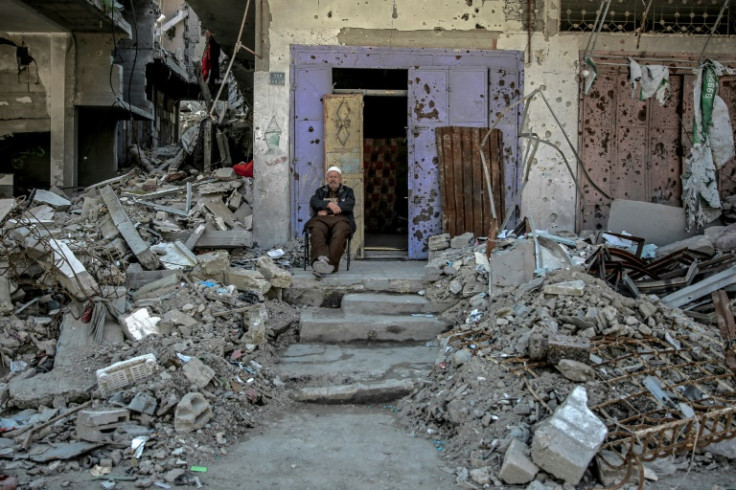
The southern Gaza Strip came under intense Israeli bombardment overnight, despite international pressure for an immediate ceasefire in the Palestinian territory where famine is looming.
Besieged Gaza is in desperate need of aid and the United States said it would continue airdrops, despite pleas from Hamas to stop the practice after the Islamist group said 18 people had died trying to reach food packages.
A fireball lit up the night sky in the southern city of Rafah, the last remaining urban centre in Gaza not to have been attacked by Israeli ground forces. About 1.5 million people are crammed in the area, many having fled south towards the border with Egypt.
The sound of explosions was also heard and smoke was seen rising in Gaza City in the north, where Israeli troops have been attacking the city's largest hospital for more than a week.
The health ministry in Hamas-run Gaza said early Wednesday that 66 people had been killed overnight, including three killed in Israeli air strikes in and around Rafah.
The fighting went on unabated two days after the UN Security Council passed its first resolution calling for an "immediate ceasefire" and urging the release of the roughly 130 hostages Israel says remain in Gaza, including 34 captives who are presumed dead.
Israeli forces have also surrounded two hospitals in Khan Yunis, where the health ministry said 12 people, including some children, were killed in an Israeli strike on a camp for the displaced.
The Palestinian Red Crescent has warned that thousands were trapped in the Nasser hospital in Khan Yunis and "their lives are in danger".
Underscoring the desperation of civilians trapped by the fighting, Hamas has asked donor countries to stop their airdrops after 12 people drowned trying to recover parachuted food aid from the sea off Gaza's Mediterranean coast.
Hamas and the Swiss-based Euro-Med Human Rights Monitor also said another six people were killed in stampedes trying to get aid.
"People are dying just to get a can of tuna," Gaza resident Mohamad al-Sabaawi told AFP, holding a can in his hand after a scramble over an aid package.
Hamas has also demanded that Israel allow more aid trucks to enter the territory, which the United Nations has warned is on the brink of a "man-made famine" after nearly six months of fighting.
The war, triggered by Hamas's unprecedented October 7 attack on Israel, has shattered Gaza's infrastructure and aid agencies say all of its 2.4 million people are now in need of humanitarian help.
The UN children's fund, UNICEF, said vastly more aid must be rushed into Gaza by road rather than by air or sea to avert an "imminent famine".
UNICEF spokesman James Elder said the necessary help was "a matter of kilometres away" in aid-filled trucks waiting across Gaza's southern border with Egypt.
The US National Security Council said in a statement it would continue trying to get aid in by road, but also said it would continue airdrops.
AFPTV footage showed crowds rushing towards aid packages on Tuesday being dropped by parachute from planes sent by Jordan, Egypt, the United Arab Emirates and Germany.
The October 7 attack resulted in about 1,160 deaths in Israel, mostly civilians, according to an AFP tally of Israeli official figures.
Israel's retaliatory campaign against Hamas has killed at least 32,414 people in Gaza, most of them women and children, according to the health ministry.
Israeli troops have shown no sign of a let-up in the fight against Hamas, with the military saying its jets had struck more than 60 targets, including tunnels and buildings "in which armed terrorists were identified".
The UN Security Council resolution passed Monday demanded a ceasefire for the remaining two weeks of the Muslim holy month of Ramadan that should lead to a "lasting" truce.
The United States, Israel's top ally, which had blocked previous resolutions, abstained from the vote, prompting Israel to cancel a planned US visit by senior officials.
Hamas leader Ismail Haniyeh said Israel was experiencing "unprecedented political isolation" and losing US "protection" at the Security Council.
Washington has baulked at Israeli Prime Minister Benjamin Netanyahu's determination to launch a ground assault on Rafah, and the United States has also expressed increasing concern over the humanitarian toll.
US Defense Secretary Lloyd Austin said before meeting his Israeli counterpart that "the number of civilian casualties is far too high, and the amount of humanitarian aid is far too low" in Gaza.
Officials from the two warring sides are in indirect mediated talks in Qatar aimed at agreeing on a ceasefire and the release of hostages.
However, both Hamas and Netanyahu said the talks were failing and blamed each other.
Qatari foreign ministry spokesperson Majed al-Ansari said this week the talks were "ongoing".
In Khan Yunis, dozens of Israeli tanks and armoured vehicles surrounded the Nasser Hospital in Khan Yunis.
The health ministry said shots were fired around the sprawling complex but no raid had yet taken place.
Israeli troops have also been engaged in heavy fighting at Gaza City's Al-Shifa Hospital, the territory's largest, for nine days.
Israel said it has killed 170 Palestinian militants and arrested hundreds there.
Israel has labelled its actions "precise operational activities" and said it has taken care to avoid harm to civilians, but aid agencies have voiced concern for non-combatants caught up in the fighting.
Palestinians living near Al-Shifa have reported corpses in the streets, constant bombardment and the rounding up of men who are stripped to their underwear and questioned.
Hezbollah and other Hamas allies have exchanged almost daily fire with Israeli troops since the Gaza war began.




